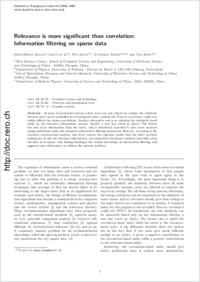Relevance is more significant than correlation: Information filtering on sparse data
- Shang, Ming-Sheng Web Sciences Center, School of Computer Science and Engineering, University of Electronic Science and Technology of China - 610054 Chengdu, China
- Lü, Linyuan Department of Physics, University of Fribourg, Switzerland
- Zeng, Wei Web Sciences Center, School of Computer Science and Engineering, University of Electronic Science and Technology of China - 610054 Chengdu, China - Lab of Information Economy and Internet Research, University of Electronic Science and Technology of China, Chengdu, China
- Zhang, Yi-Cheng Department of Physics, University of Fribourg, Switzerland - Lab of Information Economy and Internet Research, University of Electronic Science and Technology of China, Chengdu, China
- Zhou, Tao Department of Physics, University of Fribourg, Switzerland - Department of Modern Physics, University of Science and Technology of China, Hefei, China
-
07.01.2010
Published in:
- Europhysics Letters. - 2009, vol. 88, no. 6, p. 68008
English
In some recommender systems where users can vote objects by ratings, the similarity between users can be quantified by a benchmark index, namely the Pearson correlation coefficient, which reflects the rating correlations. Another alternative way is to calculate the similarity based solely on the relevance information, namely whether a user has voted an object. The former one uses more information than the latter, and is intuitively expected to give more accurate rating predictions under the standard collaborative filtering framework. However, according to the extensive experimental analysis, this letter reports the opposite results that the latter method, making use of only the relevance information, can outperform the former method, especially when the data set is sparse. Our finding challenges the routine knowledge on information filtering, and suggests some alternatives to address the sparsity problem.
- Faculty
- Faculté des sciences et de médecine
- Department
- Département de Physique
- Language
-
- English
- Classification
- Physics
- License
-
License undefined
- Identifiers
-
- RERO DOC 17378
- DOI 10.1209/0295-5075/88/68008
- Persistent URL
- https://folia.unifr.ch/unifr/documents/301438
Statistics
Document views: 120
File downloads:
- pdf: 249
